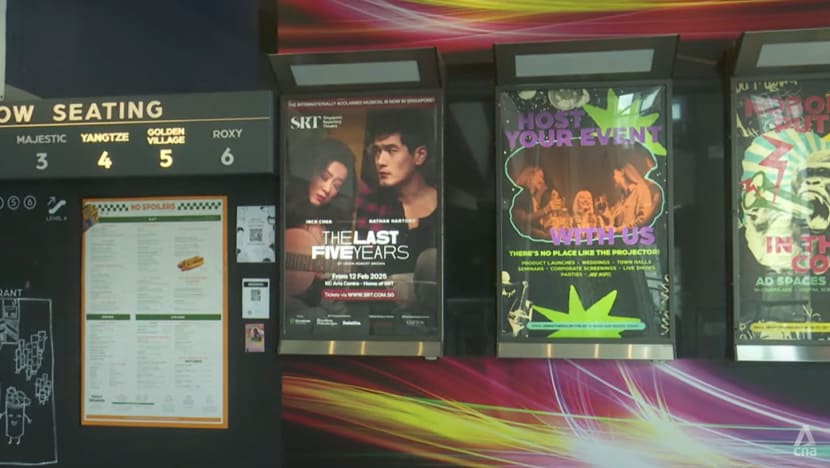Cinema operators turn to live events, niche film festivals to woo moviegoers back
Some operators said they have attracted more customers since 2024 as they battle changing movie-watching habits.

The Golden Village x The Projector outlet at Cineleisure Orchard.

This audio is generated by an AI tool.
SINGAPORE: Unique experiences have become crucial to the survival of local cinemas, amid competition from streaming services and a persistent struggle to attract moviegoers since the COVID-19 pandemic.
Some operators are now benefitting from holding live events and niche film festivals.
For example, Golden Village said it has seen footfall steadily rising, with occupancy levels reaching pre-pandemic levels in mid-2024 thanks to a spate of blockbuster hits.
It is also offering a variety of entertainment options, including live events and fan meet-and-greets.
“Cinemas will become multi-functional spaces hosting a wide range of events. Personalised experiences and premium services will be key to attracting patrons,” a spokesperson told CNA.
Singapore’s biggest cinema chain now has 15 outlets across the island, after taking over Filmgarde Cineplexes’ Bugis+ mall site in November last year.
Filmgarde had cited the pandemic and Singaporeans’ changing cinema-going habits as reasons for leaving the venue when its lease expired in early 2022. It closed its Century Square branch then as well.
Other operators have also found it difficult to bring movie fans back. Recently, Cathay Cineplexes closed its fifth cinema since 2022 as it works to repay mounting debts of around S$2.7 million (US$2 million).
Its owner and operator told CNA earlier this month that it is not giving up on the silver screen, despite these financial struggles.
INTERACTIVE EXPERIENCES
Meanwhile, indie cinema The Projector is currently battling with rising operational costs of up to 40 per cent compared to the last two years, said its founder Karen Tan.
She noted the rise of on-demand streaming services, as well as consumers “directing their attention” to social media platforms and leaving less time to head to the movies.
“Having said that, for us, our revenues have actually increased by 50 per cent from 2019 till today. But that's also because we are a diversified business model, so we're not directly comparable to traditional cinema operators,” she added.
“We also have strong F&B (food and beverage) revenue streams, because we've got a bar that has hosted a lot of events. We are also a very popular venue for corporates to hire out as well.”
Still, Ms Tan said it has been a “really tough operating environment”.
“Probably tougher than we’ve ever seen, and that’s because we’re all contending with post-COVID inflation and rents remain very high, as well as utility costs and manpower costs,” she pointed out.
The Projector, founded in 2014, currently operates at Golden Mile Tower and Cineleisure Orchard. The latter is a collaboration with Golden Village and replaced Cathay Cineplex.
Ms Tan said that when it screens films, it aims to offer other side events like a question-and-answer session with the director.
It has also worked with organisations like the Cat Welfare Society to show films about cats.
“Sometimes it’s also interactive, like dress-up nights. It’s about giving people a reason to get out of their house and come to The Projector. It’s about having a good time, a social time – not just sitting on your laptop,” she added.

This year, Ms Tan said it plans to collaborate with more local businesses and even create its own digital content, such as film reviews.
Analysts said such unique experiences will dictate whether a cinema lives on.
Dr Samer Elhajjar, a senior marketing lecturer from NUS Business School, said he believes movie theatres can get a new lease of life through more collaborations with local businesses.
“The future of the industry will largely depend on how cinema owners will try to balance between the evolving consumer preferences and maintaining profitability,” he added.
“Of course, we have to think about new ways to generate revenues, but at the same time, we need to keep the cultural significance of cinemas. That's actually very important. So you might think about repurposing cinemas as hybrid entertainment hubs.”
“MORE NICHE” EXPERIENCES
The Singapore Film Society has also seen a 10 to 15 per cent rise in footfall for its programmes through collaborations with local movie theatres, including The Projector and Shaw Theatres.
The non-profit is the country’s largest organiser of film festivals, holding events like the Singapore Chinese Film Festival and European Union Film Festival.
Its vice-chair and programming director Eternality Tan said it is holding twice the number of screenings compared with pre-COVID days, in order to keep people invested in its programmes and visit the cinema more often.
Mr Tan said its aim has always been to show “more commercial” films alongside so-called independent art-house films, such as movies about climate change or marginalised communities.
“We have brought in films like Lunana: A Yak in the Classroom … (these are) Bhutanese films that you would not see in the cinemas here. It’s these kinds of more niche experiences that we try to offer,” he said.
He added that it is about providing in-person experiences, like director Q&As, to enrich moviegoers.
“There could be little gems here and there, out there, that just somehow no one has (and are) not on anyone's radar,” he noted.
“If we are able to do it on the big screen and we promote it in a strategic way, then I'm sure audiences would want to come in and watch the film.”



















